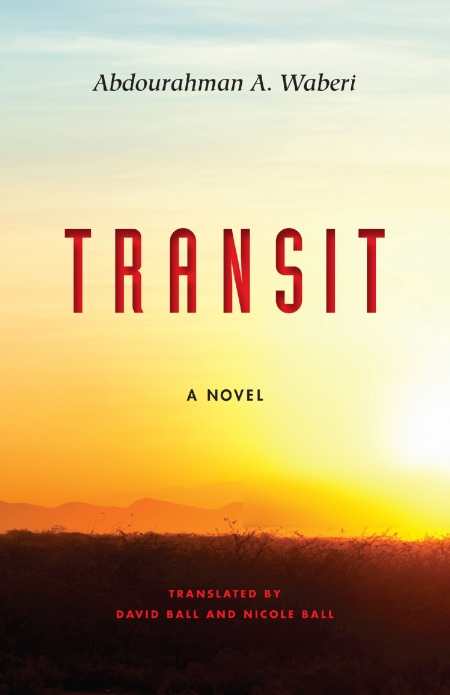
Transit
A Novel
Transit, by acclaimed French novelist and short story writer Abdourahman Waberi, is a timely and politically relevant novel. Originally published in French in 2003, it is his fourth book to be translated and re-released in English and provides much needed insight into an array of perpetually troubling issues that stem from colonialism in African countries. Transit begins in Charles de Gaulle International airport in Paris, where two exiles from Djibouti—Bashir “Binladen” and Harbi—collide and share stories of their retreat from the homeland. As they converse, a tapestry of voices from their pasts intercede and chapter by chapter, a world rife with drugs, trafficking, child soldiers, alienation, and the ever steady violence of war is masterfully revealed.
Transit features short, alternating chapters told from the perspectives of five characters: Bashir, a former soldier in Djibouti’s civil war; Harbi, an academic who returns to Djibouti after studying abroad; Harbi’s wife, Alice, a Frenchwoman; their son, Abdo-Julien, and Harbi’s father, the patriarch and last link to the Djibouti of old, a country loyal to tradition and Qur’anic ideals. Each chapter functions as a type of monologue, with the voices distinct and the rhythm and pacing of Waberi’s prose creating sharp portraits of every character.Some especially lyrical chapters could very easily operate as self-contained poems.
The translators of this edition, David Ball and Nicole Ball, express in the preface the difficulty they faced in transferring the colloquial, rough, “lower-class” French of Bashir’s character into an English equivalent. Without a doubt, they were successful. Bashir’s speech is fraught with a frenetic energy, his callous, drug-induced soliloquies made up of a sort of distorted syncopated beat (“khat make you talk-talk, dream-dream, and then zero in the brainbox”) that vividly defines his character.
Perhaps the greatest strength of this novel is its ability to create such vivid psychological landscapes that function as commentary on a political environment that is difficult to access. Through the intensely personal visions of each character, the reader is easily drawn into their terror and corruption (Bashir wantonly describing his role in murder and rape) or longing and isolation (Alice telling her son about her desire to be the ‘other’). The rhythm and flow of the prose creates an almost disbelieving state (how can we like someone who has committed such atrocities?); and the reader begins to feel they are now part of the character, sharing their movements and passions, seeing the world through their eyes.
Though these anecdotal, yet pithy chapters are beautifully wrought, they are almost too fragmentary. The framework introduced at the start—two men meeting in an airport—is never mentioned between chapters until we reach the end of the novel, removing much needed context. Each part floats as a self-sustaining piece, with very little reference made to an overarching, unifying structure. However, the chapters beautifully complement one another and together create a foggy, interlacing landscape of troubled voices. Transit is an essential volume for readers and researchers of post-colonial literature and history.
Reviewed by
Shoilee Khan
Disclosure: This article is not an endorsement, but a review. The publisher of this book provided free copies of the book and paid a small fee to have their book reviewed by a professional reviewer. Foreword Reviews and Clarion Reviews make no guarantee that the publisher will receive a positive review. Foreword Magazine, Inc. is disclosing this in accordance with the Federal Trade Commission’s 16 CFR, Part 255.
